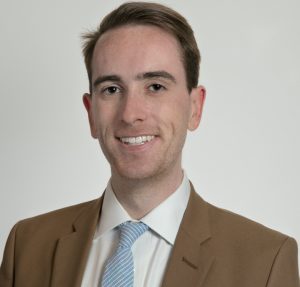Class of 2016
Federal Government Relations
National Restaurant Association
Washington, D.C.
After graduating in 2016, I moved to Washington, D.C. to join the Federal Government Relations team at the National Restaurant Association. Our job is to represent the interests of the restaurant industry on a national level to Members of Congress, the White House, and Administration officials with two key goals: 1) Educating lawmakers on the issues vital to America’s restaurant industry, and 2) Influencing legislation and public policy in a manner that benefits and promotes restaurants, employees, owners, and operators. The National Restaurant Association represents the country’s second largest private sector employer—more than 15.1 million employees staffing over 1.1 million eating and drinking establishments—which accounts for 10 percent of the nation’s workforce and over 4% of the U.S. GDP. For the past century, the Association has been the world’s largest foodservice trade organization, earning recognition as one of the leading voices and most powerful forces on Capitol Hill.
While working closely with Members of Congress is a large focus of the job, one of the most important aspects is representing and communicating with our key stakeholders. Their needs, concerns, and issues are what drive our advocacy strategy. On a federal level, this involves working with Government Relations representatives of Association members, executives of State Restaurant Associations, as well as CEOs of national restaurant and foodservice brands. As the political landscape changes, so too do the methods by which lobbyists work. Rather than relying solely on direct, “boots-on-the-ground” lobbying, the Association has a diverse and robust grassroots infrastructure, integrated into our advocacy goals. A unique and exciting part of my job is managing the administration of the Association’s political action committee—RestaurantPAC—as well as engaging in industry and issue coalitions. Through RestaurantPAC, we are able to work closely with not only elected officials, but also third party political committees to build the key relationships on which we rely to pitch our issues to appropriate audiences. Additionally, I work closely with GR professionals in industries facing similar issues, as there’s strength in numbers and value in collaboration. Reliance on these personal connections is paramount to success of advocacy.
It is sometimes difficult to give a snapshot of a day in this job, because every day is different. Issues come and go with the wind, lending no shortage of occasional difficulties and frustration. However, at the end of the day, it’s about people—my favorite part of the job. I feel privileged to be involved with and work on the behalf the most diverse industry in the country. Restaurants and their employees are the backbone of America’s economy. They are the pillars of their communities and cornerstones of social and family life. Without the tenets of community and family embodied by every aspect of the Ole Miss experience, the frantic shuffle of Washington might have minimized my recognition of the personal, emotional aspects of the restaurant industry. I’m deeply grateful for Dr. Conor Dowling, whose courses about voter participation, political parties and interest groups sparked my interest in government relations and advocacy. His classes were not easy; however, his projects were designed to force new and creative ways of analyzing situations and thinking outside of comfort zones to successfully tackle tough issues. In the ever-evolving political landscape, this has been one of the top skills on which I’ve relied when advocating on Capitol Hill. I will forever be thankful and proud to attribute my career to the Ole Miss School of Political Science.


